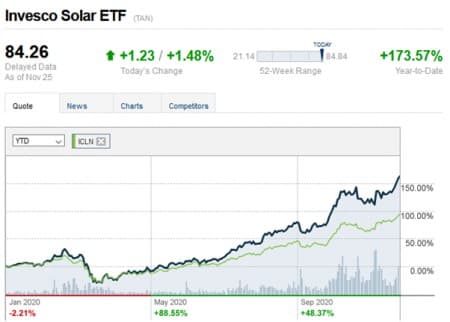With the elections done and dusted and Joe Biden firmly on the road to ascending to the Oval Office, the renewable energy sector is licking its chops at the prospects of better days under a much more supportive federal government.
Unfortunately, the fate of a Biden green deal still hangs in the balance with two outstanding runoff races in Georgia.
But that doesn’t automatically mean that Biden’s green ambitions are dead in the water. Even under a Republican-dominated Senate, Biden’s government can still undertake several executive actions and changes in personnel that will have a significant impact on the renewable energy sector, particularly the solar sector.
The solar sector has emerged as the best-performing corner of the clean energy universe during the pandemic and has continued to shine after Biden was declared president-elect. Here are 3 key reasons why solar stocks have been tipped to continue outperforming under Biden.

Source: CNN Money
#1. Eliminating solar tariffs In January 2018, the Trump administration implemented Section 201 solar tariffs on imported cells and modules at the height of the trade war with China. A presidential proclamation released back in October seeks to increase those tariffs and eliminate an exemption for two-sided solar panels.
Though the evidence is mixed regarding their effectiveness, the cons seem to outweigh the pros. On one hand, the 2.5-gigawatt solar cell import cap did provide some support for the domestic solar module manufacturing industry and also helped to level the playing field.
But the harm done is by no means negligible. According to The Hill, the 2018 solar tariffs have significantly harmed the U.S. solar sector by destroying more than 62,000 jobs and nearly $19 billion in new private sector investments. The tariffs, which began at 30% in 2018, made some imported panels more expensive, with the price of high-efficiency PERC (Passivated Emitter Rear Cell) modules nearly doubling in the United States compared to prices in other markets as the modules leave factories in China and Southeast Asia. Indeed, Greentech Media estimates that when purchased in multi-megawatt quantities, such modules now cost 32 cents to 35 cents per watt in the U.S. compared to only 17 to 19 cents per watt when manufactured. The lion’s share of those extra costs can be directly chalked up to the Trump tariffs since shipping costs clock in at a much lower 1.5 cents to 2 cents per watt.
Related: New Breakthrough Could Transform Rare Earth Mining
That the U.S. solar sector has continued to thrive in spite of--not because of--the tariffs is a true testament of how strong the solar momentum has grown. Indeed, module imports from China have been on a growth path since January 2019. That’s despite a combination of Section 201 tariffs, countervailing duties, and anti-dumping laws. One of first pieces of business expected for Biden is to order the International Trade Commission to evaluate these tariffs and possibly repeal them considering the damage they have wrought to the downstream solar industry in this country. Even partly eliminating those punitive tariffs on solar modules and inverters is expected to have tremendous positive effects on solar development.
#2. Eliminating fossil-fuel subsidies
For years, the fossil-fuel industries have enjoyed approximately $20 billion a year in both direct and indirect subsidies they receive from the government. Biden has already pledged to lower or completely eliminate those subsidies and channel the funds to renewables. This is very likely to give solar and other renewables an opportunity to play on a more level field with the oil, gas, and coal industries.
Solar and wind are already competitive with fossil fuels in many electricity generation markets. Eliminating or reduction of fossil fuel subsidies will only accelerate the shift to renewable energy.
#3. Another stimulus package
With the U.S. economy recovering but still deep in the doldrums, it’s widely expected that the Biden administration will quickly approve another multi-trillion dollar relief package which, in addition to helping millions of struggling families, will help rebuild the country’s crumbling infrastructure, including clean energy.
Direct investments into the renewable sector would go a long way in helping create well-paying jobs in industries like solar and wind and also encourage these companies to invest in their employees.
Thousands of good jobs created in their jurisdictions might be enough to persuade more Congressmen to lend support to the green deal.
From an investor’s perspective, this could be a good jumping-in point before solar gets a new lease on life.
By Alex Kimani for Oilprice.com
More Top Reads From Safehaven.com:















